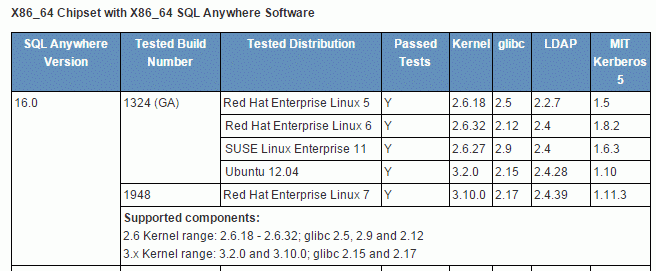|
Someone I know wants to switch 50 servers from Windows and wants to know. What is SAP favoring in-house?
|
|
Here is an unofficial answer [I.e. this is NOT an official SAP statement]: AFAIK the SQL Anywhere team does not favour any specific Linux distro. We use many different Linux distributions and versions in our lab specifically so we can test/verify that the SQL Anywhere software works on many different versions. We mainly target the enterprise versions (e.g. Redhat and SuSE) for our testing infrastructure but we also regularly use popular versions (e.g. Ubuntu, Fedora, RedFlag, and a few others). Of course there are also the many different Linux distros that work on the Linux IoT platforms (e.g. Raspberry Pi, Intel Edison, etc) that have also been used in house as part of our testing processes. Speaking personally, if I was setting up a shop that was going to run my business and I cared about keeping my data safe and available 24x7 then I would want to use a Linux distribution that was officially supported by some entity (e.g. business) so I would have some guarantee that my Linux system would continue to run when I needed it. On the other hand, if I am just "playing around" then I use whatever distro that I am comfortable with and I find easy to use. I.e. I don't think there is a "best" Linux. Depending on your situation you will want to pick a Linux version that meets your needs. 2
Breck, you just asked a question that has been debated by thousands of people for many years with no meaningful resolution (what's the best Linux?). Even narrowing down the context to SQLA 16 doesn't help. The converse is simpler (what distros are bad for SQLA 16?). But I won't attempt to answer that either. I will say that early revisions of Red Hat Enterprise Linux 6 are known to have a problem with direct I/O (transparent huge pages at play), in which case direct I/O is disabled. So if that matters to you, avoid RHEL 6.0 through, I believe, 6.5. Otherwise, if your distro of choice meets the system requirements and SQLA is able to run at all, it should run just as well as on any other distro. But experimentation for your particular use case on your particular hardware (or virtualized hardware as the case may be) is the only way you'll know for sure.
(25 Mar '15, 15:09)
Phil Mitchell
And, in case it matters, I, personally, favour Red Hat-based systems (generally Fedora for desktop, RHEL or CentOS for server). But that is entirely because I know their bugs (er, features) reasonably well, so I don't spend too much time debugging the OS.
(25 Mar '15, 15:13)
Phil Mitchell
|

